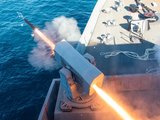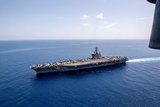As Operation Irini starts, the question is who will benefit?
The EU’s new maritime security mission, created to aid enforcing the UN arms embargo on Libya, officially stood up this week as the bloc shifts its focus to efforts prevent the trafficking of weapons into the crisis-hit North African state.
Libya has been wracked by civil war since the overthrow of Muammar Gaddafi in 2011, with multiple factions seeking political claims in the years since. Two main blocs are currently vying for power, the UN-backed Government of National Accord (GNA) in Tripoli and the Gen Khalifa Haftar-led LNA (Libyan National Army) faction.
Interestingly, two EU member states find themselves on
Already have an account? Log in
Want to keep reading this article?
More from Naval Warfare
-
![European navies line up $105.8 billion in unawarded contracts for 2026]()
European navies line up $105.8 billion in unawarded contracts for 2026
France, Germany and Italy lead the way on unawarded naval defence opportunities that could be awarded this year, but across Europe countries are ramping up their spending efforts to face geopolitical challenges.
-
![Spain’s F100 upgrade mirrors Aegis modernisation paths in allied navies]()
Spain’s F100 upgrade mirrors Aegis modernisation paths in allied navies
The Spanish Navy’s Alvaro de Bazan-class of air defence frigates will receive the latest Aegis Weapon System technology among other modernisations to extend the service life to 2045.
-
![UK’s Fleet Solid Support ship programme deemed on track despite steel supply concerns]()
UK’s Fleet Solid Support ship programme deemed on track despite steel supply concerns
Shipbuilders are saying the programme is going ahead on time as the government estimates 7.7 million tonnes of steel are needed for 2026 infrastructure projects.
-
![Raytheon unveils details of its proposal for the US Navy/NATO ESSM Next Significant Variant]()
Raytheon unveils details of its proposal for the US Navy/NATO ESSM Next Significant Variant
In an exclusive interview with Shephard, Raytheon’s VP of Shipboard Missiles disclosed what improvements the company plans to offer for the Sea Sparrow NSV.






















